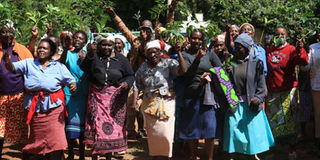Standoff in Nyeri over Dutch coffee buyer, prices

Coffee farmers protests outside Ndaroini factory in Nyeri County against the management of Gikanda Coffee Society on January 14, 2019. PHOTO | JOSEPH KANYI | NATION MEDIA GROUP
What you need to know:
- The more than 500 farmers delivering their coffee to Ndaroini factory in Mathira claim they have reached an agreement with a Dutch company that has offered them a higher price per kilo.
- To farmers, the direct sale deal is better because they will have fewer deductions from their net pay compared with the previous experiences.
Coffee farmers in Nyeri on Monday protested against a bid to block them from selling their produce directly to an overseas buyer who is offering them a better deal.
The management of the factory is against the bid by the farmers to sell to the Dutch buyer, prompting the stand-off that rekindles memories of the infamous coffee price wars.
DEAL
The more than 500 farmers delivering their coffee to Ndaroini factory in Mathira claim they have reached an agreement with a Dutch company that has offered them a higher price per kilo.
The farmers, who stormed the factory, accuse managers of Gikanda Coffee Society of seeking to move their coffee from the factory by force while they are finalising their deal with Trabocca BV, which has promised to pay for their coffee upfront.
With this deal, the farmers want to cut off their miller and marketer — Tropical Farm Management — in favour of the Dutch company, which will be transacting business with them for the first time this year.
Trabocca BV has an 18-year history in Ethiopia and is currently making inroads into Kenya. The buyer has promised to pay Sh100 per kilo of coffee delivered in the factory and an additional Sh15 to improve the factory.
Last year, Tropical marketers paid the farmers Sh98 per kilo of coffee.
Opposed to when the farmers would have their coffee milled in Thika and sold through auction, the farmers will now mill their coffee at the Kirinyaga Co-operative Union.
REGISTRATION
To farmers, the direct sale deal is better because they will have fewer deductions from their net pay compared with the previous experiences.
“We should be allowed to give our coffee to a buyer of our choice and as members we have agreed to sell our coffee to Trabocca BV. The agreement the move by with Tropical marketers is between them and the management,” noted Mr John Wandeto, a farmer.
Concerns raised by the management are pegged on the fact that Trabocca BV is allegedly not a registered coffee dealer in the country and it lacks a dealership license, a requirement under the Crop Act.
“The issue is not about Trabocca BV not being registered in the country because we are using their agent in the country- Rock Bern which is located in Westlands, Nairobi,” noted Mr Joseph Mukuha, former chairman of Gikanda, who had struck the deal in October.
Efforts to reach the Coffee Board of Kenya were futile as calls and text messages went unanswered.




